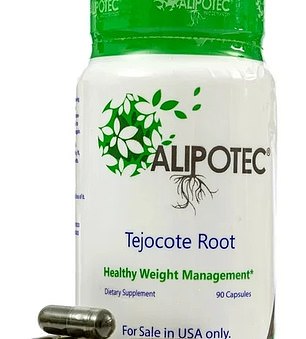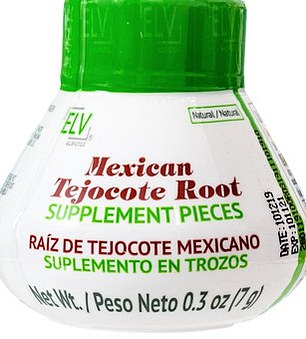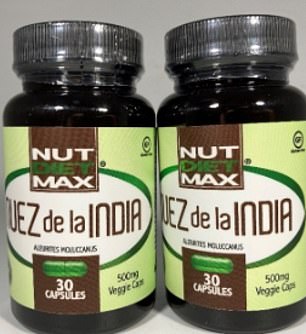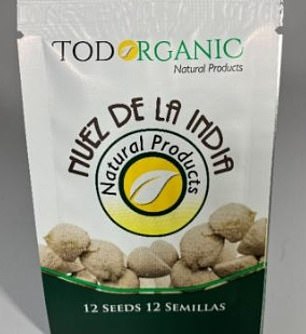Two ‘natural Ozempic’ weight loss supplements may contain a deadly poisonous ingredient, CDC warns
- Two people in New Jersey and Maryland were poisoned by yellow oleander
- Several ‘natural’ weight loss supplements are made entirely from the poisonous plant
- READ MORE: Can Your Plant Kill Your Pets and Harm Your Children?
Fraudulent nutritional supplements that gained popularity on TikTok as ‘natural’ alternatives to weight-loss drugs appear to contain a deadly plant species.
The federal government has issued a pair of warnings about products masquerading as herbal weight loss supplements that are actually made entirely of yellow oleander, a shrub so deadly it has become a common form of self-harm in Sri Lanka.
The Food and Drug Administration summoned two manufacturers of diet nut mixes labeled Nuez de la India, also known as a candle nut, after a man in Maryland was hospitalized with yellow oleander poisoning.
The Centers for Disease Control and Prevention, meanwhile, found that nine out of 10 products labeled as tejocote root and marketed as weight-loss supplements were pure yellow oleander after a toddler in New Jersey ate his mother’s Eva Nutrition Mexican Tejocote Root and was poisoned.
Supplement manufacturers can often avoid FDA oversight because the agency does not require manufacturers to prove in advance that their ingredients are safe and effective, allowing for a Wild West regulatory environment.
Authentic candlenuts can sometimes be mistaken for yellow oleander seeds


The Centers for Disease Control and Prevention tested 10 products that reported containing tejocote root. Nine of them were made entirely of yellow oleander, including the two brands depicted


Weight loss supplements claiming to contain candlenut, or Nuez de la India, were cited in FDA warning after they were found to be toxic
In the case of the Maryland patient, emergency room doctors didn’t know what was causing his nausea, slow heart rate, low blood pressure and high blood potassium levels until poison control suggested yellow oleander was the culprit.
These symptoms can indicate a wide range of possible diagnoses, from malfunctioning thyroid and kidney problems to heart attacks, and doctors find it difficult to find the underlying cause without a patient admitting to taking a questionable supplement.
Doctors in Texas recently described a similar case of candlenut poisoning. A 21-year-old woman went to the hospital with her severe nausea and vomiting but clinical tests, including x-rays and urinalysis, appeared normal.
She later said she ate a candle nut brought to her by an uncle who had recently visited Latin America and became ill about 45 minutes later.
She subsequently developed heart block, which occurs when electrical signals from the upper two chambers of the heart do not travel to the lower two chambers, causing the heart to beat too slowly or skip beats.
Doctors didn’t say outright that the nut she ate was yellow oleander, but they consulted with poison control and decided her symptoms were consistent with poisoning from the poisonous plant.
And in the case of the 23-month-old in New Jerseyan emergency physician called poison control on September 8 to report that the child had an abnormally low heart rate and low blood pressure.
The patient eventually returned to normal after receiving an antibody antidote for yellow oleander poisoning
The FDA in its announcement specifically targeted Nut Diet Max brand Nuez de la India capsules, Nut Diet Max brand Nuez de la India seeds and Todorganic Natural Products brand Nuez de la India seeds.
The agency said: The FDA advises consumers to stop using Nut Diet Max (seeds or capsules) or Todorganic Natural (seeds) brand products marketed as Nuez de la India, Indian nuts or India- seeds, as they may contain yellow oleander…consumers who have used any of these products of concern should contact their healthcare provider immediately.”
A CDC-affiliated laboratory in Oregon tested 10 products claiming to be tejocote root, which has thousands of fans touting their dramatic weight loss on TikTok. All but one consisted entirely of the poisonous plant, not the plant on the labels.
The CDC said, “Misbranded dietary supplements are often found to contain potentially dangerous substances. Tejocote root (Crataegus mexicana), a supplement promoted online via social media for weight loss, is readily available from online retailers.”
The products are sold at major retailers, including WalMart and Amazon, for about $26 for 90 capsules.
